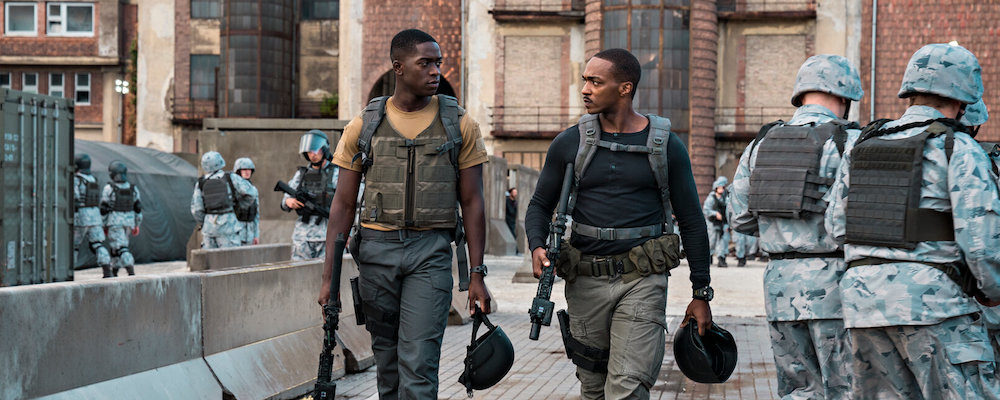‘Outside the Wire’ Enters a Futuristic War Zone With Excellent Effects and a Routine Story
Alci Rengifo
Netflix has developed a clockwork routine for making expensive, skillfully-shot action movies that boast much talent but drive-thru plots. “Outside the Wire” is the latest in this line of movies where the actors are superb, the director and team show off pristine craft, but there’s not much else for viewers who need more than lots of gunfire to feel content. Though it can’t be denied there are some intriguing ideas in the screenplay, which makes an effort at looking at contemporary issues like the nature of drone warfare and its effect on the operator pressing the button. When the movie tones down the volume it proves not to be so shallow, that is until the missiles start flying again.
Set in the not-that-distant future of 2039, the movie takes place in Eastern Europe, where the U.S. has been called in to be some kind of buffer between warring Ukraine and Russia. Into the war zone is dropped Harp (Damson Idris), a drone pilot who is facing disciplinary action after he jumped the gun and pushed the button on some fellow soldiers who were killed. The army feels he needs actual on the ground experience. They pair him up with Leo (Anthony Mackie), a commander with that typical movie attitude of having seen so much horror he has attained Zen-like wisdom. Two surprises soon rattle Harp: First, Leo is recruiting him on a dangerous mission to stop a demented (what else?) warlord from securing nuclear missiles left over from the Soviet era and firing them, and second, Leo is not human but a new generation of android that looks, well, very human. You see, this is a future where inevitably the army also uses robots for combat, and while the horizon is littered with typical walking machines sporting one, camera lens eye, Leo is so advanced he poses many dilemmas for Harp as they go into dangerous terrain.
That’s really all there is to the plot of “Outside the Wire.” Director Mikael Håfström feels like a filmmaker being pulled between wanting to explore real themes and the demands of a straight action movie. The opening scenes have real promise when Harp carries out the drone strike that gets him into trouble. It’s that rare war movie that poses a serious moral question regarding this new age of high-tech combat, where you can kill someone from afar, while staring at a screen. It’s hard to argue with the idea in the screenplay by Rowan Athale and Rob Yescombe, which ponders if these drone operators would think differently if they actually faced combat. The same could be said of most gun lovers and thrill seekers who’ve never actually faced a war zone. A character runs an orphanage where the children of victims of drone strikes are taken care of, and Harp has to face the consequences of following orders.
But this idea is soon overpowered by the movie’s loud barrage of nonstop action. This isn’t necessarily a bad thing for viewers into this sort of film, but judged as a story there’s not much left. Harp and Leo, played with great charm by Damson Idris of “Snowfall” and “Black Mirror,” and Anthony Mackie, who brings his disciplined demeanor from the “Avengers” movies, build a convincing macho buddy routine. Leo banters with Harp about his girlfriend, while Harp suspects Leo’s plan to stop the warlord might be hiding another agenda. Alas, the other moral quandary posed by the movie, that of humans and machines working together in war, only goes half-way. There are endless pit stops in bombed out Ukrainian towns where enemy troops pour in and engage in very well-shot battle sequences. Many minutes are spent on Harp dodging bullets, learning how to operate missile launchers and machine guns, while Leo keeps a cool stare the whole time.
These kinds of movies follow a beat sheet that never fails when delivering the kind of movie meant to help you battle insomnia with your Netflix account. Slick visual effects and grey cinematography drain all the color from the locales, giving the effective impression of a dreary future, while none of the robots look bad, including Leo’s own transparent android torso. This content is always fun, but inevitably the evil warlord who wants the missiles snarls under a bad haircut, giving little reason for his aims except that he’s just a warlord, and you can’t trust the androids because they might go rogue. You can already guess that Harp will eventually have to learn to pull his own weight and save the day solo. Michael Kelly plays the general who is always watching everything from central command, barking orders and getting frustrated because Leo could care less for them. No spoilers in hinting that it will all culminate in an intense standoff right on top of a missile silo just gearing up to launch.
It’s getting to the point where in the streaming era, slamming “Outside the Wire” for skillfully making a cookie-cutter action movie is almost unfair. The best one can do is warn that if you like expensive explosions and efficient camera crews filming shootouts, this one may hit the spot. Idris and Mackie make a good action movie pair convincingly inhabiting this battleground. Hopefully we can see them again soon in a bolder effort. But how ironic one of them is a robot, because “Outside the Wire” is well-built, well-funded, with an efficient design, but it does nothing more than operate on pre-programmed directives.
“Outside the Wire” begins streaming Jan. 15 on Netflix.

